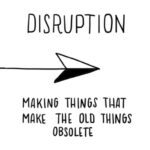
“Now I have to think in terms of scale and process, not just marketing, which is a new paradigm for me. What are your best learning resources (book, webinars, podcasts, etc.) to start thinking in terms of scale and process?”
Great question, but one that also left me with a weight of concern, disappointment, and curiosity.
“…to start thinking in terms of scale and process“?
What are people in agencies being trained to believe Marketing means? How are founders, advisors, mentors, and others, guiding startups to think Marketing is simply a matter of scale? Or process??
While I was prompted with a great question to advise and guide, I found myself more frustrated that such a question even exists.
My first thought, from a question asking how to rethink scale from this context, is that work from within an agency misleads and misinforms many people about what it means to be doing Marketing. Unfortunately, this is a common experience in agencies, and in particular, we find that most people can’t transition well from agencies to companies, let alone startups. Don’t misunderstand that as criticism of people in agencies because likewise, people who have worked in companies or startups tend not to fit in well with how agencies operate.
And before you go thinking any of this is saying that I think *everyone* at agencies is the same, come on. I’m generalizing here, trying to help the economy and startup ecosystem accelerate even more by helping people appreciate that such experiences in Marketing are very different.
We’re in an era of great job change, the Great Resignation, and this is a frequent change made or desired: from agency to startup. Can we help people make that change more effectively?
Agencies work to serve their customers’ expectations and to retain those customers. As a result, what you do is always driven a bit by what the client AND provider want. Yes, both.
I worked at Yahoo a long time ago and we, in the role of the publisher of content where ads run (a provider), work with agencies by recognizing that agencies want their clients happy, and to do that, they’ll work with/for us to keep us happy, so their client is happy. Doing that work isn’t “Marketing,” not really in the sense that Marketing is taught and practiced. It’s a slice of Marketing wrapped up into more customer service, with planning, design, creative thinking, and delivery thrown in.
Those skills are only valuable in a startup if you’re also doing all the market research, customer development, product direction, and work in growth, that the startup needs. Creative thinking and design are nearly critical in a startup, what I’m saying is that without what more a startup needs of Marketing, it’s going to fail, and your contribution is futile. If that’s your experience and what you think Marketing in a startup means, you’re completely missing the mark of what needs to be done.
Your job, in Marketing is to know, tell, and do.
Marketing is the work of the market. Your customer is not a client and the company for which you are working isn’t *really* even your employer (though technically they are), because they work for you (technically, for what you determine, in Marketing, they should be doing for the market).
At least, in successful startups that’s how it works.
EVERYTHING a startup does is a reaction to the market. Fundraising, product plan, messaging, the investments they make in decisions… All of that, MUST be because of the market and what Marketing knows and tells them, or they’re f’d
Your job is competitive analysis, SWOT, knowing investors, partners, stakeholders, government policy, journalists, influencers, and customers. Your job is messaging, branding, design, and promotion. Your job is getting things sold, funded, and in demand. Your job is DOING it: change the site, run the ads, send the email, set up the CRM. Your job is telling the company what to do, when, and why.
Sound impossible? It nearly is. Marketing is the MOST IMPORTANT work a startup or company does.
Research about startups has shown time and again that if the startup fails, it’s because Marketing failed.
Don’t misunderstand me, do you DO it all? No, of course not. The founders raise the money, but your job is making sure you all have a fundable startup because that’s determined by the market. Do you do the development and delivery of the product? No, of course not, but what, when, and how such things are delivered is largely based on the market – which is whose job?
Marketing is a HUGE job. You’re here asking how to change your mindset from experience in an agency to what it takes to work in a startup, when the job is that mindset: figure it out – What does the startup need to do to be successful??
If you think people will tell you, should tell you, or that you’re just there to do what others want or tell you to do, you are not ready nor cut out for Marketing in this capacity. Your job #1 is to figure out what is needed for the venture to be successful, do it and/or tell the others what they need to do. They may not agree with you, they might decide otherwise as is their responsibility, but “Marketing” is the job of knowing the Market so that you can inform the rest of the team as to what the market is demanding of you all.
And what might that be? Here is a very incomplete list of possibilities:
- Growth
- Funding
- Release something to get a competitive advantage
- Seek an acquisition
- We need a different team
- Sell more stuff
- Reduce prices
- Raise prices
- Host some events
- Change the model
- Fix our customer support
- Ignore those bugs, fix those others instead
- PR
- Change the logo to blue
- Add FAQs
- Run billboards
- Use a chat bot
- Tweet more
- Use Facebook less
- Relocate to another place
- Spend money on Google
- Get a better CRM
- Produce better ads
- Write more content
- Start a podcast
- Don’t go to that conference anymore
That’s the job. There is no client telling you what they want, no one directing you to their expectations, and no publisher providing you with what you might offer the advertiser. Your job is figuring it out.





I recommend that you fight the urge to do all of this alone, and remember to create a hiring strategy. Hire full-timers, interns, freelancers, whatever you need to help you accomplish all of these (and many other) goals.
This literally is why one startup I’m involved with will inevitably fail. Great product, wonderful people…no marketing, no money to hire it, and zero comprehension of how mission critical it is.
Seriously my friend, send them this thread, even if anonymously. They’re wasting their time trying, and it’s helpful to get them to see that it’s not going to work (save them the time, money, and effort).
Well articulated Paul O’Brien ! I think the agency model as it exists needs to be reshaped to the real needs of the startup community. It certainly needs to follow a systematic approach, but marketers will do a better job when we concentrate in looking into data, listening to the requirements of the marketplace, and of those who are working to bring a startup to success. Our job must be intended to guide them at any stage of their marketing funnel, and to provide the advice and tools that would make them profitable. I’d love to get deeper into the conversation, because I agree with you, and would enjoy evaluating the bullet points listed in your article.
Thank you for your insight!
I’ve thought greatly about the idea that the agency model could be shaped for startups. Many a close friend and I, in the industry (cc Kana LiVolsi, Pete Monfre, William Leake among many ? ) have explored how Agencies or freelance marketing work could be more meaningful applied to startups, where the plan and model aren’t yet known.
Could be a great meeting of the minds here, trying to crack a new model in which Agencies are more freelance-like, flexible, value equity in the relation (not just for hire), and don’t compete but instead always bring in the best possible people for a specific need at a particular startup…
Right, Jennifer Vaca, — “when we concentrate in looking into Data.”
Paul O’Brien you know I always enjoy these conversations! There is a lot to unpack here, and would love to discuss more in-depth. In order for this to work both start-ups and agencies would need to evolve their working style as this could easily become very much a win-win-scenario but both sides of the equation have to be willing to shift. If and when that happens a world of possibilities opens up.
I think a huge factor is that buying behavior has changed and agencies are not selling what clients want to buy.
Clients are cynical from being led astray over and over again by smooth talking marketing folks and they don’t want to invest in strategy or research – they want low risk, high value, short term deliverables.
Which is all fine and good as long as they understand that “doing stuff” isn’t marketing. It’s gambling. But I can’t blame them for wanting to “date” before getting “married” to an agency.
A friend said “Yeah, you just have to manage their expectations…” Which is true, except clients have very selective and short memories. You might tell them “I hope (tactic) helps you hit your objectives, and it might, but without a cohesive strategy it might not.”
30 days later they say “We haven’t made any sales from (tactic)! Gahhhh!” Sigh.
Startups are always looking for short term results and have planning fatigue. Agencies need to adapt by developing packaged services that are high impact. The agency then has the opportunity to build trust and “backfill” strategy and grow the relationship.
In order to scale, the primary goal of startups is value creation in three areas:
1. getting and keeping the attention of the people that matter most. (see “attention economy” https://en.wikipedia.org/wiki/Attention_economy#:~:text=Attention%20economics%20is%20an%20approach,only%20so%20much%20of%20it.”)
2. customer acquisition.
3. revenue generation
Get the data that matters, make informed decisions and eliminate all of the irrelevant complexity that clouds thinking and eats up limited human and economic resources.
“Get the data that matters, make informed decisions and eliminate all of the irrelevant complexity that clouds thinking and eats up limited human and economic resources.”
It’s the last part that I find is the most important, least understood, and least appreciated in all startups that fail.
100% agree with your thought, but I’d encourage that the order of operations misleads people. The GOAL is your 1, 2, and 3. Marketing is what you said after that, to KNOW how, with whom, where, and how much, to do 1, 2, and 3 ?
Agree, Paul O’Brien. Prioritization – a focus on what matters most, hence, elimination of irrelevant complexity being quite important to achieving 1, 2 & 3. We see it in product teams in global companies, not just startup’s.
Thx for the feedback and the article.
re: “but “Marketing” is the job of knowing the Market so that you can inform the rest of the team as to what the market is demanding of you all.”
I’ve gotta push back a bit only because I believe this is a very important sentence / idea. Long to short, I’m not comfortable with the word knowing (i.e., knowledge). Conceptually, knowledge has a sense of being finite and in silos.
On the other hand, I believe understanding is a far more fitting. As in, a sense of understanding is an ongoing process; the connections between the dots. For example, and I think this came up a of couple weeks back, what is an MVP but an attempt to develop an understanding of the market. And that process of sense of understanding is ongoing.
All that said, once again, again and again, good stuff!
I should add I’m in the middle of some rebranding and my new tag line is “Understanding is Power” mainly because Knowledge is no longer enough. The dots are no longer enough. You have to have – or try to have – some sense of what goes on between the dots. That’s the magic of Understanding.
Mark Simchock you always have among the most challenging and appropriate replies, the likes of which I wish the world would be more comfortable discussing and debating publicly.
Indeed, I wrestled with using the word “knowledge” here given the implication that I was saying that the Marketer “must know” or should be the person knowing it all. And yes, that is inaccurate.
I felt that Marketers would appreciate my intent, which is really more so making sure all the other non-marketing readers better grasp that the role in your organization that should be researching, seeking the data, talking to everyone, and then telling the company what to do, is marketing. They’re in the knowledge about the market role.
Most startups that fail, indeed most companies that fail, do so because they perceive marketing to be just advertising or promotion, maybe lead gen. The context of the question really provided the thrust of my thoughts here, that an Agency person was pondering how to “Scale” and “still do Marketing” – ?? Marketing is all of that, and figuring out what’s best for the company in doing that. Their supposition misunderstood.
You’re right, it’s to understand
10/10 recommend joining a start up, the people are alive and listening.
Absolutely agree, I never felt more comfortable than when I found how to work with startups!
That said, to be blunt and fair, it’s not easier work, it’s not stable work, it’s not predictable. It’s a better fit, for *some* people ??
Paul O’Brien true story, can be financially volatile and not a viable option for a lot of people.
it is time to take a deeper look into WHY we do what we do!
Approaching how we work, as a new startup, talk to employers and uncover a new business model for labor.
Enjoyed the article! What happens when you combine the two: Agency and Startup? For example, our startup business model is highly entrepreneurial, with every service we provide serving as a revenue stream with its own P&L responsibility.
So, the marketing we do for our (video game developer) clients comes first, though we encourage our in-house agency to seek other clients as well. This expands our brand to others our marketing efforts may miss, and it gives all employees in the agency greater earnings potential (through profit-sharing).
The problem, of course, is that not everyone is an “entrepreneur”, which requires a (much) increased amount of creativity, initiative, resilience, and risk-tolerance (if anyone fancies themselves an entrepreneurial marketing manager, let me know!). Do you see synergies between the two (Agency/Startup)?
I do believe they CAN find synergy, and that synergy is in the business model, not the people (frankly). That’s rather the thrust of my post, that most Agency oriented professionals just don’t work the same way as Company or Startup professionals. That’s not remotely a knock against any of them, it’s the realistic observation that the WAY those people work, and the experiences they have, are not the same (at least, not in finding success as such).
I’m reminded of how when I left Yahoo and then was looking to leave HP (my second big job), many of my peers were at Agencies, and though I had the know-how to do their job, I’m just not cut out the same way to do that kind of work. They went the Agency direction, and I went the startup direction.
Jennifer Vaca, Marc Romano, and Pete Monfre, point out some great, relevant perspective, related, above.
I’m certain Rupert Meghnot, the MODEL of the agency has to be different. Entrepreneurial people are driven by mission, change, and problem-solving, far more than results and compensation – reward the risk taken! The model for such an Agency would have to recognize and value that – typically, most don’t.
Reward the Risk Taken, strikes me as the notable distinction
Paul O’Brien it’s interesting to me that I struggle with this concept event though I’ve had five startups myself.
My first agency was a bootstrapped startup that grew to $6 annual revenue.
Others not as successful, but you would think this shift in thinking would come naturally. It doesn’t.
Very onsite full thread here. Looking forward to talking about this on the podcast.
Same